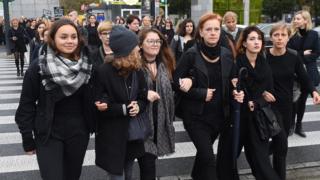
Image copyright
EPA
Black is the choice of colour for those opposing the proposed total ban
Thousands of women in Poland have gone on strike in protest against proposals for a total ban on abortions.
They marched through the streets wearing black as a sign of mourning for their reproductive rights.
Women who oppose the ban are staying away from work and school and refusing to do domestic chores, in a protest inspired by a women's strike in Iceland in 1975.
Anti-abortion protests are being held around the country too.
IVF curb
Women took to the streets of the capital city, Warsaw, in a pro-choice march on what they called "Black Monday".
They also protested in Gdansk, Lodz, Wroclaw, Krakow and elsewhere in the mostly Catholic nation.
Demonstrations were held in solidarity in other European cities, including Berlin, Brussels, Dusseldorf, Belfast, London and Paris.
Will Poland impose a total ban on abortion?
If the law – which has cleared one parliamentary hurdle so far – goes through it will make Poland's abortion laws as restrictive as those in two other countries in Europe: Malta and the Vatican.
Women found to have had abortions would be punished with a five-year prison term. Doctors found to have assisted in an abortion would also be liable for jail time.
How did the strike unfold? – Adam Easton, BBC News, Warsaw
Image copyright
EPA
Protesters gather at the main square in Wroclaw
The strike didn't have a huge visible impact in the sense of affecting economic life in Poland. Even in large cities like Warsaw almost all shops were open and companies and offices went about their day-to-day business.
But then bringing the economy to a halt was never a realistic goal even though some companies, museums and restaurants did allow female staff to take a day off.
What was noticeable was the level of support for the protest. On the streets, trams and buses of Polish cities many women wore black in solidarity with the strike.
Thousands of people braved the rain to join a demonstration in Warsaw's historic old town. Some men helped out, cooking soup and serving sandwiches. The French actress Juliette Binoche tweeted her support for the protest during a visit to Krakow.
What's apparent is that the vast majority of Poles do not want a more restrictive abortion law. In a recent Ipsos opinion poll, only 11% favoured that option.
Almost half said the existing legislation should remain unchanged, while more than a third said abortion should be more widely available.
Abortion is already banned in most circumstances in Poland.
The current exceptions are:
- where the woman's life is in danger
- where there is a risk of serious and irreversible damage to the foetus
- where the pregnancy is as a result of rape or incest – this must be confirmed by a prosecutor
Critics say the tightening of the law could mean women who have a miscarriage are also investigated, on suspicion of having had the pregnancy terminated deliberately. At early stages of pregnancy, miscarriages and abortions have indistinguishable symptoms.
One protester said: "We are saying 'enough is enough' over what is happening, to what the government, the Church and the so-called pro-life organisations are planning for women.
"They want to introduce an anti-abortion law which will mean in many cases, women will be sentenced to death. It will take away the sense of security they have, the treatment options available when pregnancy puts their lives or health in danger."
One gynaecologist warned that the law as it is worded now could effectively lead to doctors being unwilling to do invasive prenatal tests and lifesaving operations.
Image copyright
EPA
Prof Romuald Debski, who works at a hospital in Warsaw, told Polish media: "Whoever causes the death of the unborn child is punishable by imprisonment up to three years. If I have a patient with pre-eclampsia, who is 32 weeks pregnant, I will have to let her and her child die.
"I have to, because if I perform a caesarean section and the child dies, I may go to prison for three years, because the child was premature."
Pre-eclampsia is a potentially fatal condition that can develop in the second half of pregnancy and can only be cured by delivering the baby.
A separate bill seeks to curb in-vitro fertilisation (IVF), allowing only one embryo to be fertilised at any one time, and banning the practice of freezing embryos.
The Catholic Church is among those who support the total ban. The Polish Bishops' Conference asked Catholics to pray for "the conscience and the light of the Holy Spirit on all Poles who protect human life from conception to natural death".
The country's foreign minister was another high-profile critic of the protests.
Witold Waszczykowski told Associated Press: "We expect serious debate on questions of life, death and birth. We do not expect happenings, dressing in costumes and creating artificial problems."
While pro-choice activists marched in black and tweeted pictures of themselves wearing black, anti-abortion activists chose white for the colour of their counter-protests.
Image copyright
@MadameClaudine1
'If we agree that a mother can even kill her own child, how can we tell other people that they shouldn't kill each other?' wrote one woman
Image copyright
@killingbizzle
One Polish pro-choice activist tweeted "gosh, how lovely this is" and included images of support messages from around the world
Aside from Malta and the Vatican, the only European countries with stricter laws than Poland has at present are:
- Republic of Ireland
- Andorra
- Liechtenstein
- San Marino
- Northern Ireland (a part of the UK whose abortion law differs from England, Scotland and Wales)
Even by conservative estimates there are far more illegal abortions than legal ones in Poland – between 10,000 and 150,000, compared to about 1,000 or 2,000 legal terminations.
Leave a reply







Warning: count(): Parameter must be an array or an object that implements Countable in /home/httpdxfc/say-med.com/wp-includes/class-wp-comment-query.php on line 405